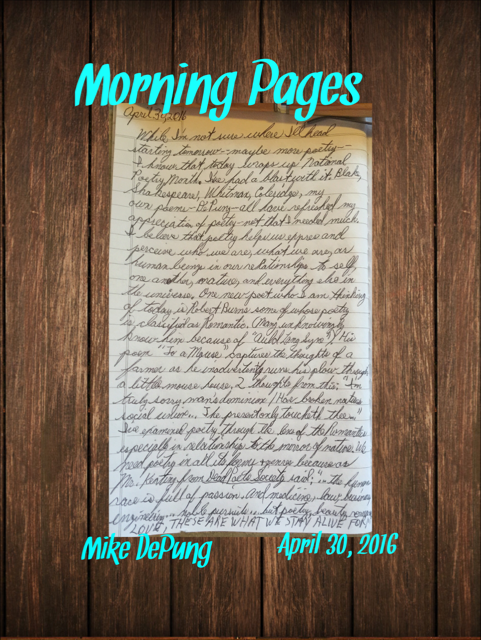 Did you ever come across some old pictures, chuckle a bit, cry a bit, or just reminisce in awe as you looked through the box or album remembering the people, personalities, mountains, beaches, sunsets, waves, etc.? To me, that’s lyric poetry. Poetry reminds me of who and what we are as amazing, complex, fault-ridden yet perfect human beings. The right words in the right order, words that communicate the magic of life — whether it is black or white magic. Such magic intrigues me, and I have had a blast exploring that this National Poetry Month, a month that has renewed my appreciation of the value of words and poetry. It doesn’t all appeal to me, but neither do all people or wines or foods or cultures — you get it; however, I can appreciate those which I encounter. Because of my predilection for Romantic philosophy and writing, I have viewed poetry and, consequently, life this past month through that lens. Another poem that I have been thinking of this month and one that I used to introduce the Romantic Period to my students is “To a Mouse,” written by Robert Burns, who you know from the New Year’s song “Auld Lang Syne.” The poem captures the moment that a farmer inadvertently plows through a mouse’s house and startles the little creature. Burns and his narrator use this occasion to reflect on the relationship of nature and humans — (he primarily wrote this, purposefully, in an archaic Scottish dialect): “I’m truly sorry man’s dominion / Has broken Nature’s social union, / An’ justifies that ill opinion,/ Which makes thee startle, / At me, thy poor, earth-born companion, / An’ fellow mortal!” In these few lines, the farmer proclaims the sympathies of caring and cognizant and aware humanity: nature has a justified fear of us, even though we are on the same planet. The farmer takes it further as he communes with the little mouse about all of the mouse’s preparations against winter, and one of the most famous lines sums up his reasoning: “But Mousie, thou art no thy-lane [not alone], / In proving foresight may be vain. / The best laid schemes o’ mice an men gang aft agley [often go amiss], An’ lea’e us nought but grief and pain / For promised joy.” Yes, the title to John Steinbeck’s famous novel Of Mice and Men is taken directly from this poem, and the plot line resonates with it. However, the second point I would like to take from this poem derives from the last stanza in which the farmer declares “Still, thou are blest, compar’d wi’ me! / The present only toucheth thee: / But oh! I backward cast my e’e, / On prospects drear! / An forward, tho’ I canna see, / I guess an’ fear!” We as humans, in all of our abilities, choose to engage in life-altering worry over the past that cannot be changed and over the future that we do not know. The mouse, though, just looks at the now, the present, and would think, “Hey, I need a new house. Better get about the business of building it. Isn’t it a nice day?” Or something like that! No worry. Nature used as a mirror, showing us who and what we are as humans and offering us helpful, instructive insight — awesome! I finish this month with the words of the character John Keating (played by Robin Williams) from the film Dead Poets Society: “We don’t read and write poetry because it’s cute. We read and write poetry because we are members of the human race, and the human race is full of passion. Medicine, law, business, engineering — these are noble pursuits and necessary to sustain life, but poetry, beauty, romance, love — these are what we stay alive for.” We need these human family snapshots to keep us grounded, and they may actually help us to come to know Self. That’s worth spending a little time of looking through the humanity family album in the form of poetry!
0 Comments
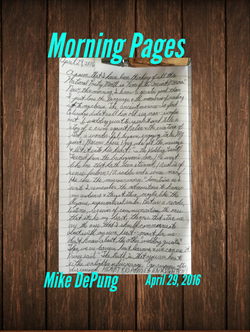 It’s still National Poetry Month until tomorrow! I have been thinking about a poem all month, but it just never seemed the time to share it. I always enjoy how energy works — the law of attraction! The poem? “Rime of the Ancient Mariner” by Samuel Taylor Coleridge. You probably know one quote from it: “Water, water everywhere nor any drop to drink.” However, I was thinking of the way the poem begins. The premise rests on an ancient mariner — glad Coleridge didn’t call him an old seaman! — who experienced a traumatic ocean voyage some unknown time past, maybe hundreds of years ago. It was a poem in the Romantic Period of literature which stressed the imagination and elements of nature. The lesson that the old sailor learned was at great personal expense for the transgression of spontaneously and without explanation killing an albatross, a bird that seemed to bring good luck to the ship on which he was sailing. His atonement was that he had to wander the earth communicating his experience to enlighten others. The ship becomes stranded, and after losing the whole crew — well, if you’ve never read it, you should give it a try. It’s another one I would have fun reading on a video. Anyway, at the end, the ancient mariner proclaims to the targeted wedding guest “He prayeth well, who loveth well / Both man and bird and beast. / He prayeth best, who loveth best / All things both great and small / For the dear God who loveth us, / He made them one and all.” The mariner learned his lesson, and he told it (of course, he seemed to have no choice!). The reader might wonder, though, if the wedding guest got the message. “…the Wedding Guest / Turned from the bridegroom’s door. / He went like one that hath been stunned, / And is of sense forlorn: / A sadder and a wiser man, / He rose the morrow morn.” The singled out wedding guest heard the message, and it impacted him. Why is now the right time for this poem? This morning, I was thinking about what I should write. I had thought about the prevailing writing philosophy that you know your target audience and cater to them. Until really recently, I wasn’t even sure who that was, and I had no idea how to find out before I actually put stuff out there and got a response. Like the mariner, though, I had to communicate my message, not knowing if my writing would be effectual. I think it has to some extent, but I haven’t met up with “a sadder and a wiser man” as a result of my work. However, I think that I am emitting positive vibes, good energy. The other thing that cinched the reference to this poem was a video that a social media friend shared of Prince. It’s so awesome when we learn what underpinning beliefs drive some of the greats in their field. I wish there had been a different ending for Prince, but who am I to judge that, except to say that there are times when we don’t listen to the right inner voice. Anyway, in an MTV interview, Prince said, “The truth is that you are here to either enlighten or discourage.” I sincerely hope that I am enlightening, at least a tad. I think that we can know if we are listening to the ego or our hearts by the effect we have on others. Do we discourage or enlighten? I think that puts some responsibility on those of us who receive communication. If a message in whatever form strikes our heart as meaningful, then we should respond, regardless if we are the perceived “target audience” or not. If the idea resonates with us, we are the target. The reality is that I doubt I fit into the demographics of few target audiences any more. Maybe I’m kind of like the ancient mariner “whose eye is bright, / Whose beard with age is hoar.” So, I will simply take everything I can to heart; you, whoever you are, just keep living your heart and enlightening this world. And I thank you for it! 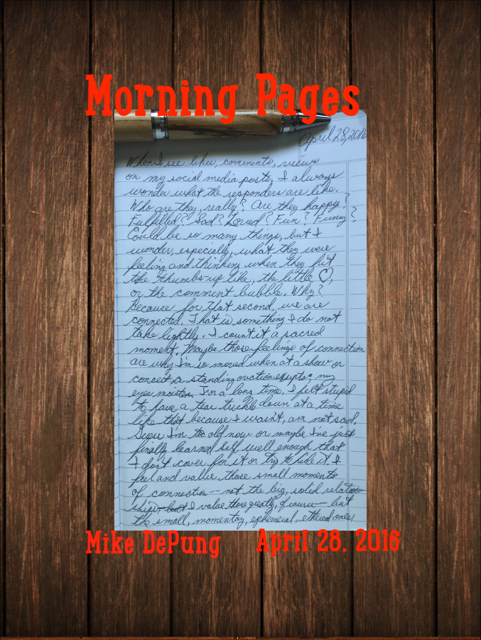 Social media provides wonderful opportunity for connections. I will make clear how I feel about these connections: sacred. I value relationships, choose to engage in some, and judge to what extent I can be involved in others. Whatever my personal engagement, I usually wonder what the responders to my posts are like or how they feel at the time they hit the thumbs-up like, the little heart, or the comment bubble. Are they happy? Morose? Confused? Loved? Fun? Funny? Fulfilled? For those few seconds of response, we are connected. I don’t take that lightly. I’ve always valued connections , no matter how brief. I will say that I usually get to know people really fast, and it’s not because I’m nosey or gabby. People just sense that they can talk to me, that I value them, and that I don’t mind listening to them. Because I sense the energy of others and appreciate them, I don’t necessarily have to spend personal time with them to feel their personalities. I suppose in some ways I’m talking about empathy. For instance, when I am at a show or concert and I’ve just witnessed a great performance that evokes a standing ovation, my eyes water up and a tear or two might trickle down my cheek. When I was younger, I felt stupid because I wasn’t sad, and the normal response is not to have tears. I know because I look around and others aren’t usually crying, but I can’t help it. Same way when really amazing music is pulsing through me. I suppose I’ve learned Self and gained enough maturity that I don’t care anymore, so I don’t try to hide it. Such connections just cause me to respond that way. So, it’s no big puzzle that I wonder what people who respond to my posts are feeling. If you read this and I respond to things you put up on social, know that whatever you shared made a connection with me, meant something to me. Ultimately, I prize these ethereal, although ephemeral, connections, and I muse about such things all the time. The following poem is a result of such wonderment. Sunglasses of a Paisley Persuasion I wonder if little Annie Lost, discarded, or destroyed The sunglasses — the remnant frames looking up at me puzzled -- no trace of lenses and arms. I wonder if little Annie cried, Cried when she realized that her little sunglasses were gone, Never to be seen again -- The brightly-colored paisley-patterned frames with Fanciful swirls of blue, yellow, and green with just a Splash of orange — now smushed On the parking lot asphalt adjacent to the soccer fields. The diminutive size says that Annie must have been there with Mom and maybe Dad to bring Brother or maybe Sister To a game or maybe practice. Was Annie tired with her curly-haired head slumped over Mom’s or Dad’s shoulder, And did the cute little sunglasses slip unnoticed off of her sleepy brown eyes On the bright, mild, and windy early evening? Or, did she tire and throw a little tantrum, The paisley frames flung without thought or care? Victim or perpetrator, little Annie? It matters little, really, because either way Annie lives on, I live on, We live on. But I truly would like to have been there, Would like to have retrieved that cute little pair Of paisley sunglasses, Would like to have seen a bright smile light up her sleepy eyes. Michael DePung Connections — they bring me a lot of joy! 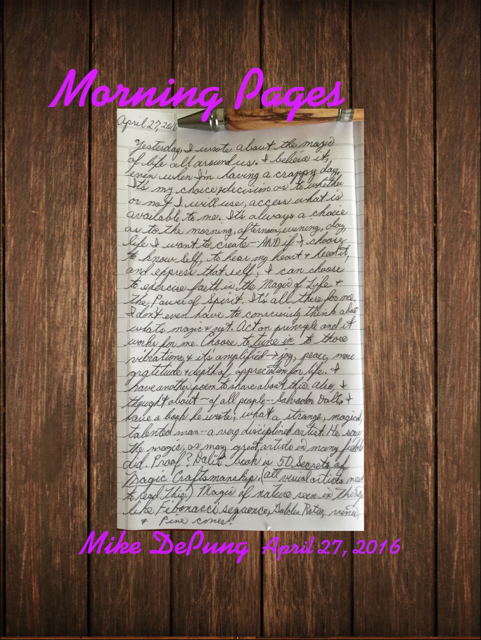 The best, happiest, most fulfilling following-my-heart experiences occur when I choose to seek and discover the magic of life. Those times propel me to gain unique insight into life. Oh, I’m not speaking of something that would impress anyone else — just ideas that make me grateful because I see the bigger picture and rejoice in the intricacies of this universe. I can listen to my heart and still be so busy that I don’t make myself slow down enough to ask the questions that yield more insight. It is a choice, and if it’s the most fulfilling, significant choice, then why wouldn’t I choose it? It’s like anything else that’s good for us: sometimes we do it, and sometimes we don’t — just because, some excuse. In my Morning Pages post this morning (picture above), I referred to Salvador Dalí. I thought of him because I have been to his museum in St. Petersburg, Florida, and I bought one of his books. Guess what it’s titled? 50 Secrets of Magic Craftsmanship. Interesting, but wait. Outside of the museum a huge Fibonacci spiral displaying the Golden Ratio proportion makes up a large section of the walkway. Dalí was greatly influenced by and used the mathematical principles of these. His book explores this, in part. Of course, in his own quirky, brilliant, buoyant way, he advises young artists on how to excel at the craft, but there is so much to learn from him, even if you are not an artist. What would that be? How he saw the magic in life all around him: the proportions and design in fish eyes, sea urchins; the power of plants and sex or not to encourage creativity; woods used for various helpful devices, woods that have specific energies; specific exercises that engage the artist in exploring the subconscious and dream states. Dalí saw depths of magic all around him and appropriated magic for his needs. So can we. The magic that he sought and found made him exceptional. Yep, can do the same for us. So, you see, I desire to keep working on discovering self and helping others to discover self. I educate through one-on-one work and through writing and speaking, so I need encouragement, proof, examples that this stuff is real, no matter how simple it may seem. Sometimes I seek magic, and the revelation of that is personal proof. Here’s one example. Free for the Seeking Two pine trees standing stately on the swath Of subdivision common ground, Gently wafting and dispensing the scent of their sweet resin, Not constantly, not obnoxiously but rather sparingly As befits a gift so rich to human sense, For too much would overwhelm and desensitize the nose, Cheapen the gift. Two Pines yielding yet more wealth, At least I count it so, Their knobby seed cones that I gather for starting fires. Full of fragrant, sticky resin, They burn hot -- A natural accelerant. Having harvested several bags for this season, I scanned The ground under the trees, The soft bed of dead needles, silky, almost silent to walk upon, kneel on, Looked relatively bare. Satisfied, I wondered how many neighbors knew of the cones’ use; I wondered if anyone would be disappointed At seeing the cones harvested. Next morning, walking my dogs, I stopped in shock as we neared the Pines. For there, a new crop of cones Lay scattered on the silky carpet. I looked up and in the early morning, undiluted light The Pines’ tops blazed with an abundance of cones, Cones yet clinging, golden brown in illumination, Waiting to gingerly, sparingly Distribute their wealth -- Not gaudy, not extravagantly, But rather judiciously, To supply those seekers of beauty, To supply those seekers of Nature’s wealth, To encourage those seekers of self and relationship to all. 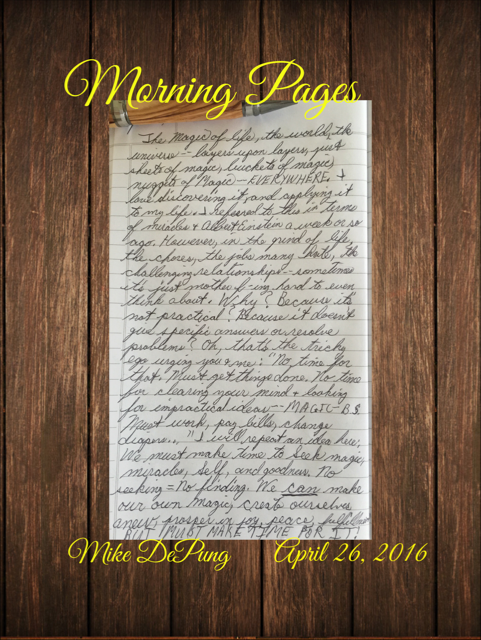 Do you know how a common, even irritating day can be transformed? I do, at least for me, but maybe I’m high maintenance. I need magic. Oh, you don’t believe in magic? That is irrelevant to some extent. Magic is all around us. Miracles and magic — all around us. Nuggets of magic waiting to be discovered. Sheets of magic floating through the ether, waiting to be plucked from the air to be gently swaddled around us. Miracles waiting to be invoked by the magic. Do you want to find the magic and experience the miracles? I can’t promise you anything, but I know that they have been there for me, are there for me now. In fact, I need some, but like I said, I need some every day — high maintenance. The Universe, though, is very cool; high maintenance is no sweat to infinite Spirit. What? You must work, call the insurance company, take the kids to school, … . The pressing issue of your soul, though, is you must seek the magic and miracles of life. A big hindrance is the filter of our ego telling us all those musts are problems. Why can’t the magic and miracles be in all those musts. Seek it; you will discover it. What do I mean? Maybe the poem below will help. Maybe not. But I know you have to make it happen for yourself, and the fact that you can is magical in and of itself. Creating Miracles Early morning, golden sun morning, Blue sky morning, bird song morning, Busy traffic in the early rush hour streets morning, People walking, people jogging morning, Dogs barking morning. Morning tells me, “Rejoice today.” I did not understand the morning. When my student cancels our meeting, I neither understand nor rejoice. When I feel insignificant, non-contributory to life, I neither understand nor rejoice. When I think of all I want to do and erect limitations, I do not rejoice. I mowed the lawn and worked with a neighbor; Then, through the cajoling south wind Pushing and pecking against a boisterous north wind -- Summer and Spring playing, Crow called for magic of creation, Robin trilled for magic of new growth, Mourning Dove cooed for magic of rebirth. Their crisp, dulcet song -- “Blue morning said, Golden sun said, Dancing green trees said, The Soul of the World invoked, The Universe evoked, ‘Rejoice!’” I heard, then, and I rejoiced. Rare day, playful day, Luscious day, golden sun day, A significant day, contributing day, Miraculous day. Magical day. I’m going to leave the emphasis for today right here. It must be your seeking and your discovery. I hope you see what I did to discover the magic and create a miracle. You need to have the mindset that the magic and miracles are there. The alternative has no odds, no hope. Magic here, Magic there. Magic and Miracles everywhere! Grab them! |
Questions to consider:How many times have you asked yourself or simply thought about the following questions?
Who am I, really? What is my truth? How do my actions reveal what I really feel and believe? What would I do with my life if I could do anything? What is my passion? Why am I here? How can I discover answers to any of these questions? If you have considered any of these questions, I hope that my experiences and writing will give you some guidance. Please read my blog and comment and share your thoughts. I would love to hear from you! Archives
December 2019
Categories |

